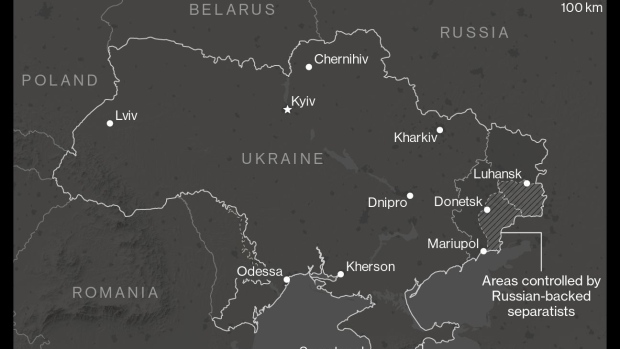Feb 22, 2022
West Plans Sanctions as Putin Orders Troops to Breakaway Zones
, Bloomberg News

(Bloomberg) -- U.S. and European governments threatened new sanctions after Russian President Vladimir Putin recognized two self-proclaimed separatist republics in eastern Ukraine and ordered troops sent to them in the latest escalation of Moscow’s standoff with the West.
Russia gave no details on how many “peacekeeping” troops might go into the breakaway regions of Donetsk and Luhansk, or when, as the U.S. and its allies continue to warn Moscow could soon start a full-scale invasion. Russia denies it plans any invasion of its neighbor. Treaties Putin signed with separatist leaders Monday allow Russia to deploy forces and build military bases on their territory.
European natural gas prices surged as oil closed on $100 a barrel and Russian shares tumbled on the signs of further tensions.
The Kremlin move raised the stakes with the West but so far falls short of the massive invasion of large areas of Ukrainian territory that U.S. and other officials have said is possible.
At the same time, more than 150,000 Russian troops remain massed near Ukraine’s borders, according to Western estimates. A senior U.S. official said Russia is continuing to prepare for military action that could occur in the coming hours or days. A key unknown is whether Russian “peacekeepers” would stop at the line of contact between separatists and the Ukrainian military.
President Joe Biden issued an executive order prohibiting U.S. investment, trade, and financing to separatist regions of Ukraine, and Ambassador Linda Thomas-Greenfield said additional American sanctions against Russia would be coming on Tuesday. The U.K. is set to impose sanctions on Russia as soon as Tuesday, while the European Union will start the process of agreeing penalties for Putin’s actions.
For the moment, western officials indicated that Russia’s recognition wasn’t a dramatic enough step to prompt the severe economic sanctions threatened in case of a full-scale invasion. A senior administration official told reporters the sanctions currently planned are separate from the more severe economic measures the Biden administration has said it would impose should Putin move forward with an invasion.
“It’s not yet the invasion our partners have been talking about,” Lithuanian Foreign Minister Gabrielius Landsbergis told reporters in Paris. “But it’s a very steep escalation of the situation.” He said the EU’s actions could include sanctioning individuals responsible for Monday’s move, as well as a ban on European companies from operating in the occupied regions.
Russian assets slumped for a fourth day, with the benchmark MOEX Russia Index sinking as much as 9.2% and the ruble dropping against the dollar. The Stoxx Europe 600 fell 1.9% at the open, and was down 0.7% as of 10:15 in Frankfurt.
Russia’s latest move generated condemnation from the U.S., EU and nearly all representatives of the United Nations Security Council who spoke on Monday night. China’s ambassador to the UN, Zhang Jun, called on all sides to exercise restraint.
The U.S. said the White House was still open to a meeting between Biden and Putin -- predicated on Russia not proceeding with an attack. Secretary of State Antony Blinken is scheduled to meet with Foreign Minister Sergei Lavrov in Geneva Thursday to discuss the crisis.
EU foreign policy chief Josep Borrell told reporters that foreign ministers would hold an emergency council in Paris Tuesday afternoon to make a decision on sanctions.
Sanctioning individuals involved in the recognition of the two Ukrainian regions is a more limited move that could happen relatively quickly. Reaching agreement on broader sanctions and what would trigger those -- against sectors like defense and finance -- is expected to take longer and could require a meeting of leaders.
Russia doesn’t currently plan any military deployment beyond the existing borders of Ukrainian breakaway areas it’s recognized and wants to pursue diplomacy with the West, said a political expert close to the Kremlin.
“The crisis can still be resolved,” said Alexei Mukhin, head of the Moscow-based Center for Political Information, which provides consultancy services for the presidential administration. Russia’s demands for a halt to NATO expansion and a pullback of the alliance from eastern and central Europe are just a starting-point for negotiations on security guarantees in the region, he said.
The recognition of the so-called Donetsk People’s Republic and Luhansk People’s Republic reflects a conviction in Moscow that stalled 2014 peace accords can’t be salvaged and should stabilize the simmering conflict there, according to Mukhin.
The Russian president’s decision to recognize the separatists effectively torpedoes years of diplomatic efforts to implement a peace accord to resolve a conflict that has killed 14,000 since Russia-backed separatists seized control of the two areas in 2014.
In Moscow, Russian legislators are scheduled to vote to ratify the treaties with the separatists later Tuesday, opening the way for more open Kremlin support for the enclaves it’s backed since their foundation.
Why Russia-Ukraine Tensions Are So Hard to Defuse: QuickTake
Ukrainian President Volodymyr Zelenskiy urged calm in a late-night address to the nation, saying Putin has in practice merely “legalized” troops already present in self-proclaimed republics since 2014. He assured his citizens that Ukraine’s borders were safely guarded, saying “there are no reasons for your sleepless night.”
©2022 Bloomberg L.P.

